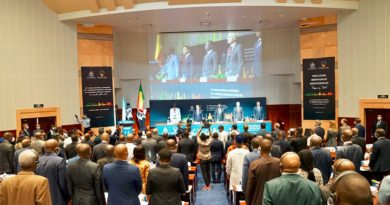Crackdown on illicit health and counterfeit products identifies 179 suspects in Southern Africa
An operation across Southern Africa supported by INTERPOL against the trafficking of illicit health products and other goods has led to the identification of 179 suspects and to the seizure of products worth some USD 3.5 million.
Operation Afya II which ended last month saw more than 4,000 inspections carried out at warehouses, storerooms, pharmacies and other premises in rural areas, triggering more than 300 investigations across the ten participating countries: Angola, Botswana, Eswatini, Lesotho, Malawi, Mozambique, Namibia, South Africa, Tanzania and Zimbabwe.
Under the auspices of its Illicit Goods and Global Health Programme, INTERPOL supported the region by sharing intelligence on trends and priority targets relating to pharmaceutical and other counterfeit crimes.
With a particular focus on disrupting criminal activity and removing from the markets counterfeit products and illicit medicines potentially harmful for the public during the pandemic, almost 40,000 illicit medical products were seized during the operation.
Commenting on the operation, Mozambique’s National Criminal Investigation Service (SERNIC) said in a statement: “The illegal production, distribution and sale of medicines contribute daily to the deaths of thousands of children and adults across the world. The participation of Mozambican Law Enforcement Agencies in Operation Afya II helped increase the level of synergies in combating criminal organization groups that are dealing with pharmaceutical crimes and other harmful products, especially during this period when the region in particular is impacted by the pandemic.”
Particularly within the Southern African region, the pandemic has shown a surge in the trade of illicit medical products and other related items, including vaccines, face masks and fake COVID-19 certificates.
“The trafficking in illicit goods and health products in particular is a serious crime endangering consumers which needs to be tackled on a regional and worldwide basis. Operation Afya II highlights how organized crime groups have been expanding their illegal activities across borders and between regions, taking advantage of technology to generate significant profits,” said Nawa Mubita, Head of the INTERPOL Regional Bureau in Harare.
Operational highlights included:
- Botswana seized more than 1,700 counterfeit goods including illicit medical products, alcohol and foods.
- Eswatini authorities seized more than 5,000 illicit pharmaceutical items after carrying out 3,780 checks during the operation.
- More than 32,300 illicit pharmaceutical products were intercepted in Mozambique, including analgesics, antibiotics, sedatives, dietary supplements, antifungal medicines, and ovulation checks.
- Namibian authorities arrested nine suspects and seized alcohol and tobacco products worth some USD 12,000.
- In South Africa, authorities arrested seven suspects and seized counterfeit goods and manufacturing equipment worth almost USD 1 million in one inspection alone; 48 suspects in all were intercepted in the country during the operation, in addition to
tobacco products worth some USD 1 million. - Zimbabwe seized more than 1,000 medical products and identified 83 suspects during the operation.
In addition, illicit tobacco seizures leapt from some 170 products during Operation Afya in 2018 to an estimated 203,000 products this year. Alcohol seizures also increased significantly from some 3,250 units seized in the previous operation to an estimated 286,000 units in Operation Afya ll.




